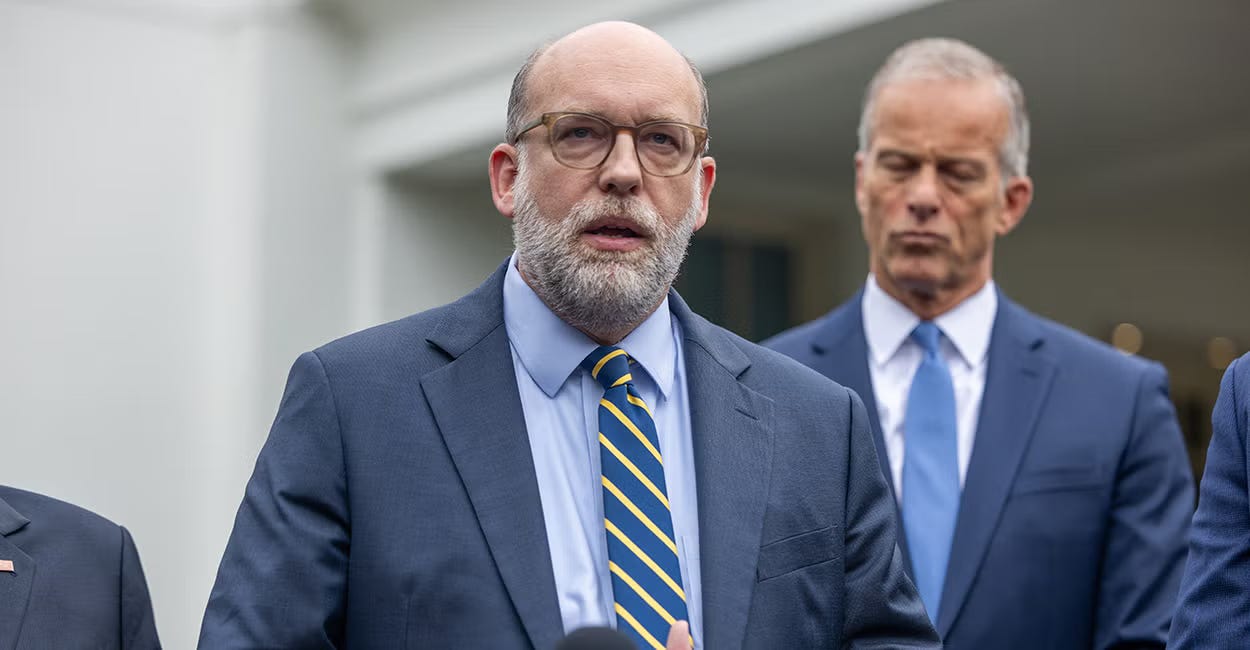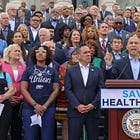Democrats stand firm against Vought’s slash-and-burn shutdown tactics
Trump’s budget chief quickly weaponized the executive branch against political enemies as Democrats vow not to back down from their health care demands.

I almost missed him.
Rep. Adriano Espaillat (D-N.Y.) paced by me as my eyes clung to my phone while a group of reporters and I staked out a closed-door House Democratic Caucus meeting on Wednesday morning.
White House Director of the Office of Management and Budget Russell Vought had just announced the Trump administration’s plans to freeze $18 billion in federal funding for two New York infrastructure projects to expand and renovate the Northeast Corridor rail line in New Jersey and New York City and expand the Second Avenue Subway into East Harlem—a neighborhood with limited transit access that Espaillat represents in Congress.
When I chased him to get his reaction to the breaking news, it was clear that he hadn’t heard it yet.
“He did that?” Espaillat asked me before putting the decision into perspective. “That’s a terrible mistake because [East Harlem] is the biggest transportation desert in the country.”
Espaillat came to find me on his way out of the meeting with more to say.
“The Gateway Tunnel is really a national security issue because the whole Northeast Corridor is so fragile that you need Gateway to really open it up,” he added. “And so they’re messing with national security and the biggest public transportation desert in the country, where hundreds of thousands of people don’t have access right in the middle of the biggest city in the world.”
House Minority Leader Hakeem Jeffries (D-N.Y.) said the administration was also messing with thousands of federal jobs.
“That’s consistent with what the Trump administration has consistently done throughout their time in office: lose jobs, cause economic pain and hardship for the American people,” he added. “It’s shameful, but it’s very consistent with the Trump administration’s track record of failing on the economy and targeting working-class America.”
Vought would later cancel nearly $8 billion in clean energy awards across 16 Democratic-leaning states. The Department of Energy put the official figure at $7.56 billion, covering more than 220 projects ranging from grid upgrades to solar installations. But in his own announcement, Vought rounded up and made the political intent unmistakable, branding the cuts as a rollback of “Green New Scam” funding. The states on the list read like a Democratic electoral map: California, New York, Illinois, Massachusetts, Washington and a dozen others. And his agency is expected to spearhead the mass firing of an untold number of federal workers beginning as early as Friday.
The moves offer a preview of the slash-and-burn approach Vought plans to accelerate during a shutdown expected to stretch at least six days while lawmakers are out of town this weekend. Democrats acknowledge the suffering his decisions will inflict—on federal workers and communities tied to the projects now frozen or eliminated—but they’ve signaled no intention of backing down. Their policy demands remain the same as before the government funding deadline expired Wednesday morning: Extend the Affordable Care Act’s enhanced premium tax credits, restore the Medicaid funding Republicans cut in President Donald Trump’s signature domestic legislation, and erect guardrails to prevent officials like Vought from using GOP votes to claw back funding for programs the administration dislikes.
“Unfortunately, Republicans have shown zero interest in even having a conversation. After the White House meeting on Monday, we’ve seen behavior by the President that is unserious and unhinged,” Jeffries told reporters this afternoon. “And [Senate Minority] Leader [Chuck] Schumer [(D-N.Y.)] and myself haven’t gotten a single phone call as it relates to a follow-up conversation.”
Government shutdowns shift power toward the executive branch by giving the White House greater control over federal agencies’ operations without congressional funding. Ahead of this shutdown, the Trump administration signaled it would use that authority to carry out a large reduction-in-force plan to shrink the federal workforce and limit agency functions. Officials also made clear they would freeze or eliminate funding for projects in Democratic-leaning states and cities as part of their broader strategy.
Vought has been the administration’s point person on this effort. He previously served as Trump’s budget director and later led the Center for Renewing America, a think tank that helped develop Project 2025—an initiative that outlined plans to weaken the federal bureaucracy, expand presidential authority and redirect resources away from programs conservatives oppose. Now, back in government, Vought has applied those ideas in real time during the shutdown.
But what the White House describes as an efficiency drive has sweeping practical consequences regardless of one’s political affiliation. Freezing projects and trimming staff means stalled bridges and transit upgrades, shuttered research labs and fewer workers processing benefits. It appears communities represented by members who’ve opposed the Republican funding bill will be hit hardest as Trump transforms the shutdown into a political weapon and a vehicle for advancing Trump’s long-stated goal of reorienting government around his agenda.
Republican leaders have openly acknowledge the shutdown as a chance to pursue long-standing ideological goals.
“It does give an opportunity to eliminate bloated, unnecessary federal programs that we would like to vote down, but we never had the votes in the Senate to do,” Speaker Mike Johnson (R-La.) said Wednesday on the conservative Moon Griffon Show. “Now we have the moment. So, very real harm to real Americans, but ultimately could be a benefit to the country for taxpayers if, in this process, we can get rid of some of the government fat.”
Democrats see that posture as confirmation that the shutdown is less about fiscal restraint and more about reshaping government according to Trump’s terms.
“Everything that Donald Trump has said about the government shutting down, everything that Mike Johnson has said about the government shutting down, everything that the Trump administration has said about the government shutting down confirms the fact that Republicans are delighted to shut down the government,” Jeffries told me hours after Johnson’s remarks. “Why? Because they want to continue to hurt everyday Americans … and certainly they want to continue to hurt civil servants who, in many cases, have served this country well, including in uniform for decades.”
Jeffries cast the divide as one between cruelty and care, accusing Republicans of using the shutdown to reward wealthy donors and corporate interests while Democrats fight to preserve health care access for ordinary families.
“Democrats are holding firm because we’re standing up for the health care of everyday Americans,” he said. “We’re going to do that today, we’re going to do that tomorrow, we’re going to do that this week. We’re going to do that next week. We’re going to do that until this issue is resolved.”
Vought isn’t the first boogeyman Democrats have targeted during Trump’s second term. Earlier this year, they spent months hammering Elon Musk when the billionaire briefly led the Department of Government Efficiency (DOGE). Musk’s aggressive cuts earned him plaudits from MAGA loyalists but quickly turned him into a political liability. He ultimately returned to his private life in disgrace after conceding that the backlash to DOGE’s agenda had affected his public image.
The contrast with Vought is instructive. Unlike Musk, who parachuted in as a temporary government employee, Vought holds a permanent seat in Trump’s Cabinet and wields real authority over the federal purse at least as long as Republicans hold congressional majorities. Even so, multiple Capitol Hill sources and members of the political class told me Democrats see an opening. They intend to make Vought so politically costly that the president feels compelled to sideline or remove him altogether.
Rep. Gregory Meeks (D-N.Y.), who chairs the political arm of the Congressional Black Caucus, told me the group would “absolutely” invest its resources to mobilize support for Vought’s ouster.
“We’re going to utilize all of our resources to get the word out to the American people because the power always belongs to the people, and the people’s voices get out there,” Meeks said. “We saw what took place, for example, when the Republicans were trying to violate or have Jimmy Kimmel put to the sidelines. So we’re going to put our money where our mouth is with the CBCPAC and let our communities know that we are fighting and we’re going to make sure that we protect their pocketbooks and their ability to afford care.”
Meeks said the CBCPAC’s outreach would include social media, influencer campaigns, local media, in-district events, public housing and Black institutions like churches and barbershops.
“We intend on going to where the people are,” he added.
Trump’s budget chief isn’t the only font of anxiety for some rank-and-file House Democrats, who worry enough of their counterparts in the Senate will buckle under the perceived political pressure of an extended shutdown and surrender the precious capital Democratic unity has accumulated up to now. Two Senate Democrats who voted against the Republican bill earlier this month flipped their votes this week. A group of bipartisan senators was spotted on the floor on Wednesday in what was later described by a source familiar with the conversation as an informal discussion to gauge how far apart the two sides actually are.
“Donald Trump and Republicans have barreled us into a shutdown because they refuse to protect Americans’ health care,” Schumer said in a floor speech earlier in the day. “Republicans tried to bully us, but they can’t. They don’t have the votes.”
Without any more defections, Senate Majority Leader John Thune (R-S.D.) is still five votes short of advancing the bill.
Jeffries and Meeks—two of the New York congressional delegation’s most influential leaders—expressed confidence on separate occasions this week that they believe Schumer will continue to hold the line, but some of their colleagues would prefer a bit more assurance.
“We all need to get into a room and make sure we’re on the same page so we can win,” a House Democrat told me. “It’s not about just winning a damn election, but winning for the American people.”
Still, Democrats remain undeterred because they believe they’re on the right side of this fight, a conviction buoyed by recent public opinion data.
In a Washington Post poll of 1,000 Americans, the public blames Trump and Republicans (47 percent) more than Democrats (30 percent) for the shutdown and a large majority (66 percent) wants the ACA subsidies extended even if it prolongs the shutdown. (Marist, New York Times/Sienna and Morning Consult polls also found more respondents blamed Republicans over Democrats for the shutdown by at least seven points.)
“The American people recognize that the Trump Administration would rather continue illegally gutting the federal workforce and programs that they don’t like and congressional Republicans are content to let them do so,” a second House Democrat told me. “The poll confirms that the American people want Congress to work together to pass a budget that ensures the health, safety and economic well-being of every American and addresses the looming healthcare crisis.”



